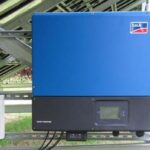 As the world transitions towards renewable energy sources, the need for efficient energy storage solutions has become increasingly apparent. Hybrid Energy Storage Inverters (HESIs) have emerged as a pioneering technology, offering a comprehensive approach to managing energy from both renewable and traditional sources. In this article, we delve into the innovative capabilities of HESIs and their transformative impact on the energy landscape.
As the world transitions towards renewable energy sources, the need for efficient energy storage solutions has become increasingly apparent. Hybrid Energy Storage Inverters (HESIs) have emerged as a pioneering technology, offering a comprehensive approach to managing energy from both renewable and traditional sources. In this article, we delve into the innovative capabilities of HESIs and their transformative impact on the energy landscape.
Understanding Hybrid Energy Storage Inverters
Hybrid Energy Storage Inverter Supplier (HESIs) are sophisticated devices that combine the functionalities of energy storage systems and inverters in a single unit. These versatile systems can store excess energy generated from renewable sources such as solar or wind power, convert it to usable AC electricity, and seamlessly integrate it with the grid or onsite power systems.
Key Features and Benefits of HESIs
HESIs offer a myriad of features and benefits, including:
-
Optimized Energy Management: HESIs intelligently manage energy flow, prioritizing renewable energy sources when available and seamlessly switching to stored energy during periods of low generation or high demand.
-
Grid Independence: HESIs provide the flexibility to operate independently from the grid, allowing users to store excess energy for use during power outages or peak demand periods.
-
Increased Self-Consumption: By storing excess energy generated from renewable sources, HESIs enable users to maximize self-consumption, reducing reliance on grid-supplied electricity and lowering energy costs.
-
Enhanced Grid Stability: HESIs support grid stability by providing ancillary services such as frequency regulation, voltage support, and reactive power control, contributing to a more resilient and reliable power system.
Applications of Hybrid Energy Storage Inverters
HESIs find applications across various sectors, including:
-
Residential Energy Management: HESIs enable homeowners to optimize energy use, reduce electricity bills, and enhance energy independence by storing excess solar energy for use during peak hours or at night.
-
Commercial and Industrial Facilities: HESIs help businesses manage energy costs, improve power quality, and reduce their carbon footprint by integrating renewable energy sources and optimizing energy storage.
-
Microgrids and Remote Communities: HESIs play a crucial role in microgrid and off-grid applications, providing reliable power supply, reducing diesel generator usage, and promoting energy autonomy in remote communities.
Challenges and Future Developments
While HESIs offer significant benefits, challenges such as cost, scalability, and interoperability with existing infrastructure remain. However, ongoing advancements in technology, coupled with supportive policies and market incentives, are expected to drive further innovation and adoption of HESIs in the years to come.
Conclusion: Empowering a Sustainable Energy Future
Hybrid energy storage inverter supplier (HESIs) represent a paradigm shift in energy management, offering a holistic approach to integrating renewable energy sources and optimizing energy storage. With their ability to enhance grid stability, increase self-consumption, and promote energy independence, HESIs are poised to play a central role in shaping a more sustainable and resilient energy future. As the demand for clean, reliable, and efficient energy solutions continues to grow, HESIs will remain at the forefront of innovation, empowering individuals, businesses, and communities to embrace a greener, more sustainable tomorrow.
